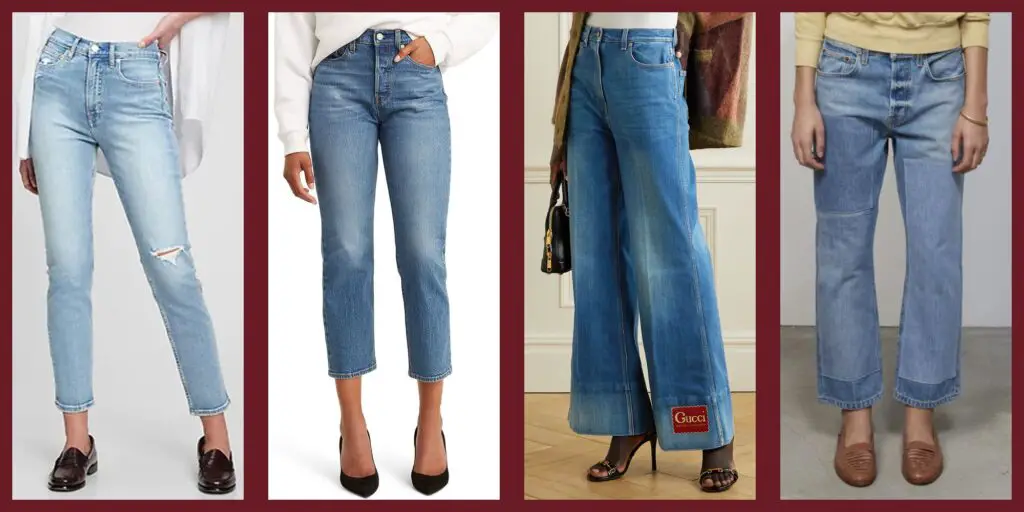Blue jeans were traditionally identified with blue collar work and manual labor. They were invented to get dirty and to withstand abuse without disintegrating. Blue jeans were the ultimate “durable” workwear.
From their humble physical labor beginnings, blue jeans rapidly became a symbol of casual wear during relaxation, jobs around the house or when engaged in hobbies. They have also symbolized rebellion.
However, it’s not only the use of denim alone, but the condition and the style of blue jeans worn that can influence how appropriate they are for specific occasions.
If they are considerably worn out or feature tears even for fashion purposes, these characteristics will influence where they can be worn.

Do Jeans Qualify as Professional Attire?
Most people would answer NO, they do not. Your appearance is a crucial part of being a “professional” including dressing in a clean and neat manner.
Your personal appearance in the workplace can make quite a difference depending on your job. Looking unkempt or relaxed may not communicate to prospective clients and higher management that you are indeed, a professional.
Most first impressions are made in the few first minutes. How you look, smell, and present yourself will influence those you are meeting. Most basic workplace dress codes do not involve jeans unless it is casual Friday.
Are Jeans Considered Classic Menswear?
Actually, they are considered a piece of classic menswear. Many CEOs in Silicon Valley and of startups do in fact wear jeans to work with casual sports jackets or blazers. So, does it follow that jeans are acceptable attire at work? This will depend on the work environment.
When Is It Appropriate to Wear Jeans to Work?
Many professionals, especially younger ones, as when is it acceptable to wear jeans in the workplace. It’s crucial that you know if your company or employer has a dress code or not.
If your employer does not have a written dress code, you’ll need to understand your company’s “unofficial” dress code.
Consider your surroundings and your colleagues. If you work for a clothing manufacturer or even a fashion company, you may fit right in by wearing jeans. If you work in a bank, in management, finance, or in law firm, jeans may not be an acceptable choice.
Some workplaces will accept jeans if paired with a sports jacket or blazer and a nice pair of clean and polished shoes.
What About Geographical Location?
Where your business is located can also make a big difference when selecting appropriate professional clothing. Dress code rules may vary depending on if you work in a small town or big city.
If you work in a rural location, jeans may be entirely acceptable in the workplace. The local culture of the location will influence what is acceptable and what is not.
In a rural location, a jacket may be overdressing and a nice cardigan with a clean pair of jeans may be more fitting. High pressure cities like London or New York may not allow jeans in the work environment.
Also consider how tolerant your work location is of denim as a rule. Japan is a prime example. This country produces denim, but you will not see Japanese professionals wearing jeans in a place of business.
The national culture does not include wearing informal attire for professional purposes. The only exception might be for a jean manufacturer holding a specific event.
It’s very important to observe the country and city where you work, to understand the level of denim tolerance and in what context wearing jeans is considered acceptable.
What Styles of jeans May be Acceptable for the Work Environment?

Jeans come in many styles, cuts, and colors, so it can be challenging deciding if a pair of jeans are appropriate for the workplace. A safe guide to follow when considering wearing jeans to work might include:
-
-
- Jeans should not be faded
- Jeans should not be worn out
- A pair of jeans should not be torn or feature tears
- Jeans should be plain and without embroidery, patches, studs, or other decorative elements
- Generally, avoid fashion forward styling and select a darker colored pair
-
The fit of jeans is equally important when considering wearing a pair to the office. Don’t wear baggy jeans that appear to be overly large during wear. Carpenter style jeans are likewise more appropriate for carpenters but not for other professions.
Once you have established that it is acceptable to wear jeans in your work environment, select a slim or straight leg fit that can easily be paired with a jacket if need be.
Do Not Betray Professional Expectations
Even if you are a banker in a rural town, you still need to dress for your profession. Be careful when introducing jeans into your professional environment because being overly casual could hurt your professional credibility.
For managers, and white-collar pros, consider that the general public, clients, and business associates will have expectations about how you should dress for your profession and will influence, even subconsciously, their opinion of you.
If your company’s culture includes wearing jeans in the workplace, then you can include them in your professional attire.
If your job includes manual labor or requires functional workwear, then you most probably can wear jeans to work. You may also want to consider nice cotton slacks as an alternative to jeans. They may easily be as comfortable yet offer a less casual look.
Jeans are great for durability and rough work environments, and they can be washed often.
Why Are Jeans Not Allowed at Work?
If jeans are deemed inappropriate at your work, it’s because they are considered too casual for your professional workplace.
If your employer does not have a written dress code, you need to consider your professional environment, your geographical location, and the local culture of appropriate workwear.
These three factors will help you decide if indeed you can wear a pair of jeans to work, what style of jeans are appropriate, how often, and if you need to pair the jeans with a jacket.
Your appearance will indirectly affect people’s opinions of you professionally, whether it’s your boss, your client, or professional colleagues. Good dressing!







